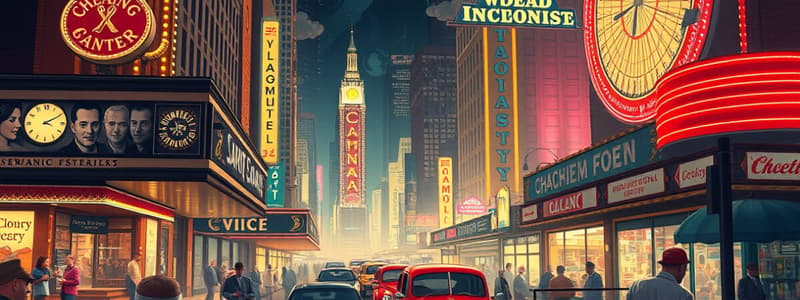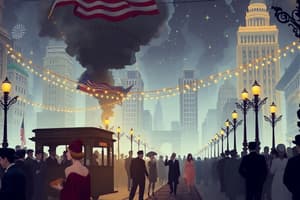Podcast
Questions and Answers
What was a significant factor contributing to the economic boom of the Roaring 20s?
What was a significant factor contributing to the economic boom of the Roaring 20s?
- A decline in consumer spending
- Decreased investment in the stock market
- Increased female workforce participation (correct)
- Restriction of consumer loans by banks
What event is referred to as Black Thursday?
What event is referred to as Black Thursday?
- The spike in consumer loans
- The beginning of the stock market crash in 1929 (correct)
- The end of World War I
- The peak of unemployment in the Great Depression
What was a consequence of the rapid stock price increases in the late 1920s?
What was a consequence of the rapid stock price increases in the late 1920s?
- A decrease in loans taken out for stock purchases
- Investors' heightened awareness of economic issues
- Sustained economic growth aligned with stock valuations
- Unsustainable stock valuations compared to company growth (correct)
What was one impact of the Great Depression following the stock market crash?
What was one impact of the Great Depression following the stock market crash?
Which development in advertising occurred during the Roaring 20s?
Which development in advertising occurred during the Roaring 20s?
Study Notes
The Roaring 20s and Its Economic Boom
- 1918 marked the end of World War I, leading to economic prosperity in America.
- The era is known as the Roaring 20s, characterized by cultural changes and economic growth.
- Troops returning from war stimulated delayed projects, boosting the postal economy.
- Increased female workforce participation contributed to higher consumer spending.
Rise of Consumerism and Advertising
- The first radio advertisement debuted in 1920, effectively promoting new products.
- New household inventions like vacuum cleaners and electric washing machines became popular.
- Banks began granting loans liberally, enabling more consumers to purchase gadgets and cars.
Stock Market Speculation
- Interest in the stock market surged as everyday Americans began investing their savings.
- Investors, including ordinary citizens, engaged heavily in trading stocks.
- Many took out loans to finance stock purchases, boosting market activity even further.
Economic Indicators and Market Distortions
- By 1929, total wealth in America had doubled, and investments increased by 218% since 1922.
- Rapid stock price increases outpaced actual company growth, leading to unsustainable valuations.
- Rising interest rates and slowing production revealed underlying economic issues, yet many ignored these signs.
The Stock Market Crash of 1929
- October 24, 1929, known as Black Thursday, marked the beginning of the stock market crash.
- Investors sold over 12.9 million shares, causing an 11% market drop; this set the stage for panic selling.
- On Black Tuesday, the Dow Jones fell by 12%, losing $40 million in a single day.
The Great Depression and its Impact
- The Great Depression ensued, marking the worst economic downturn in industrialized history.
- The Dow continued to fall for three years, losing 90% of its value from its 1929 peak.
- Unemployment peaked at 24.9%, leading to widespread job loss and company closures.
The Socio-Economic Effects
- Many banks failed, with depositors recovering only 10 cents on the dollar.
- Soup kitchens and homelessness became common as the financial crisis deepened.
- The hardship spread globally due to increasing globalization, influencing political landscapes.
Lessons Learned and Regulatory Changes
- The Great Depression highlighted the dangers of market speculation and excess debt.
- Franklin D. Roosevelt introduced regulatory measures to protect consumers and stabilize the economy.
- The creation of the Federal Deposit Insurance Corporation (FDIC) and the Securities Exchange Commission (SEC) addressed these issues.
Conclusion
- Fear, greed, and speculation remain relevant in finance today.
- Reflections on the Great Depression serve as vital reminders of the potential consequences of financial irresponsibility.
The Roaring 20s and Its Economic Boom
- The end of World War I in 1918 initiated a period of economic growth in the United States.
- Known as the Roaring 20s, this decade featured significant cultural shifts alongside economic expansion.
- Returning soldiers stimulated the economy by launching previously delayed infrastructure projects.
- Increased participation of women in the workforce played a key role in boosting consumer spending.
Rise of Consumerism and Advertising
- The debut of the first radio advertisement in 1920 revolutionized product marketing.
- Popularity of new household inventions, such as vacuum cleaners and electric washing machines, surged among consumers.
- Banks adopted a practice of granting loans more freely, allowing consumers to purchase new gadgets and automobiles.
Stock Market Speculation
- Growing interest in the stock market attracted ordinary Americans to invest their savings.
- Both everyday investors and speculators engaged extensively in trading stocks.
- Many individuals financed their stock investments through loans, further inflating market activity.
Economic Indicators and Market Distortions
- By 1929, American wealth had doubled, and investments surged by 218% from 1922.
- The surge in stock prices outstripped actual corporate growth, leading to inflated valuations.
- Rising interest rates and stagnating production highlighted economic vulnerabilities, which many investors overlooked.
The Stock Market Crash of 1929
- October 24, 1929, referred to as Black Thursday, marked the onset of the stock market crash.
- Over 12.9 million shares were sold in a single day, resulting in an 11% drop in the market and inciting panic selling.
- Following the crash, Black Tuesday saw the Dow Jones tumble by 12%, equating to a loss of $40 million in one day.
The Great Depression and its Impact
- The Great Depression was the deepest economic downturn in the industrialized world.
- The Dow continued to plummet for three years, ultimately losing 90% of its value since its 1929 high.
- Unemployment rates soared to 24.9%, resulting in massive job losses and numerous business failures.
The Socio-Economic Effects
- A wave of bank failures left many depositors with insignificant returns, only recovering about 10 cents on the dollar.
- Soup kitchens became commonplace, and homelessness rose as the financial crisis intensified.
- The global nature of the downturn affected economies worldwide and altered political dynamics.
Lessons Learned and Regulatory Changes
- The Great Depression exposed the perils of stock market speculation and excessive borrowing.
- President Franklin D. Roosevelt enacted regulatory reforms to protect consumers and stabilize the economy.
- Establishment of the Federal Deposit Insurance Corporation (FDIC) and the Securities Exchange Commission (SEC) aimed to address financial abuses.
Conclusion
- The themes of fear, greed, and speculation remain pertinent in contemporary finance.
- Historical reflections on the Great Depression underscore the potential hazards of financial irresponsibility and market overreach.
Studying That Suits You
Use AI to generate personalized quizzes and flashcards to suit your learning preferences.
Description
Explore the dynamic decade of the 1920s, known as the Roaring 20s, where America experienced an economic boom following World War I. This quiz covers the cultural shifts, rise of consumerism, and stock market speculation that defined the era. Test your knowledge on how these factors contributed to a transformative period in American history.




